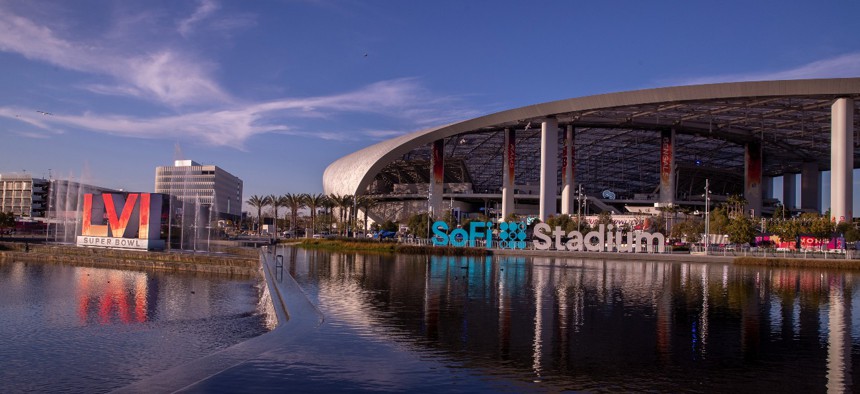
Allen J. Schaben / Los Angeles Times via Getty Images
The Homeland Security Department Has a Playbook for the Super Bowl
More than 500 DHS personnel are providing support for this year’s game.
In the leadup to the Super Bowl, the Homeland Security Department is working to support state and local partners to prevent human trafficking and the sale of counterfeit goods, among potential issues on and around the game, as it does every year.
On Sunday, the Los Angeles Rams and Cincinnati Bengals will face off in the 56th Super Bowl at the SoFi Stadium in Inglewood, California. The stadium, which can hold 70,240 individuals, is expected to be full and everyone must be vaccinated and wear a mask, the Los Angeles Times reported. This is the second Super Bowl amid the coronavirus pandemic as the 2020 game happened shortly before conditions worsened.
“The Department of Homeland Security is fundamentally a department of partnerships, and those partnerships are critical to ensuring the safety and security of Super Bowl operations as well as that of the surrounding community,” said DHS Secretary Alejandro Mayorkas in a statement on Wednesday. “Our dedicated DHS workforce is working collaboratively alongside our federal, state, and local partners to provide operational and technical support to the NFL, City of Inglewood and State of California to keep this national event safe.”
More than 500 DHS personnel are providing support for this year’s Super Bowl. This includes “extensive air and maritime security resources; anti-human trafficking prevention and enforcement support; intellectual property enforcement; chemical, biological, radiological, nuclear and explosives detection technologies; venue, cyber, and infrastructure security assessments; intelligence analysis and threat assessments; and real-time situational awareness reporting for our partners,” said a press release from DHS.
The DHS agencies involved are the following: U.S. Coast Guard; Countering Weapons of Mass Destruction Office; U.S. Customs and Border Protection; Cybersecurity and Infrastructure Security Agency; Federal Emergency Management Agency; Immigration and Customs Enforcement; Office of Intelligence and Analysis; Office of Operations Coordination; U.S. Secret Service; Transportation Security Administration; and DHS’s Blue Campaign (within the Office of Partnership and Engagement and aligned with the DHS Center for Countering Human Trafficking).
In order to combat sales of counterfeit goods, every year DHS’ National Intellectual Property Rights Coordination Center, overseen by ICE, runs “Operational Team Player” in collaboration with Homeland Security Investigations (a directorate of ICE), CBP and the NFL, which starts at the end of a Super Bowl and runs until the next one.
Ricardo Mayoral, acting assistant director and director of the National Intellectual Property Rights Coordination Center, told Government Executive on Thursday, they are “working with our partners, more specifically, Customs and Border Protection and the LAPD Sheriff's Department, we are conducting targeted law enforcement operations to not only identify who is peddling this merchandise…but with the goal of seizing it and, if we have to, arrest individuals who are selling it.” He said so far there has been nothing out of the ordinary this year, besides having to adjust to the local COVID-19 restrictions, but the work itself has not been impacted.
“Operation Team Player,” which is a year-round effort, seized $97.8 million worth of goods since the last Super Bowl, agency officials announced on Thursday. The number was about $45 million last year and $123 million the year before that, which was the highest ever.
Mayoral attributed the drop from 2020 to COVID-19. He also noted that as a result of the pandemic there has been an increase of fake websites, especially through social media ads, selling counterfeit goods.
As for CBP, “primarily Air and Marine Operations, who secure the border from the air and sea; the Office of Field Operations, the CBP officers at international airports and ports of entry; and the Border Patrol, who work between the nation’s ports of entry – brings unique skills to the table,” said a post from CBP published on Sunday. “It’s much like how different football players have different skill sets that mesh to become one effort: offensive and defensive linemen who are the 'heavies' up front, clearing the way; skill position players who catch and carry the ball or defend against the long pass and watch for 'trick' plays; and a quarterback and supporting coaching staff who look for issues as the game unfolds – all coming together for a winning combination.”
As in the past, the event was submitted voluntarily to the agency for a risk assessment, in which DHS deemed it as a “Special Event Assessment Rating Level 1.” This means that this is a significant event that has national and international importance and needs substantial federal support.
During a briefing on Tuesday, Mayorkas was asked about how “far right conspiracists are promoting online a Super Bowl Sunday, February 13, anti-COVID restrictions trucker convoy outside of SoFi stadium,” which is similar to one happening in Canada.
Mayorkas said the agency is watching what is going on in Canada, but it is “very difficult to speculate” what will happen before, during or after the game. DHS is ready to address anything that happens.
Yahoo News reported on Wednesday that DHS warned law enforcement and public safety officials that this truck driver protest intends to get to Washington, D.C. by late March, which could disrupt President Biden’s State of the Union address, which is scheduled for March 1. The convey “could severely disrupt transportation, federal government, and law enforcement operations through gridlock and potential counterprotests,” said the warning.
White House Press Secretary Jen Psaki was asked during the briefing on Wednesday for the president’s thoughts on what’s happening in Canada. “We support peaceful protest[s], but we have concerns when those protests turn violent,” she replied. “I think it's important for everyone in Canada and the United States to understand what the impact of this blockage is—potential impact on workers, on the supply chain. And that is where we are most focused.







